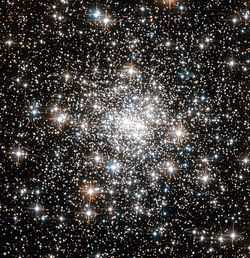NGC 6642
| NGC 6642 | |
|---|---|
|
Image of NGC 6642 was created from visible and infrared images taken with the Wide Field Channel of the Advanced Camera for Surveys. Credit: ESA/Hubble & NASA | |
| Observation data (J2000 epoch) | |
| Right ascension | 18h 31m 54.23s[1] |
| Declination | 23° 28′ 34.1″ |
| Distance | 26.4 kly (8.1 kpc)[2] |
| Physical characteristics | |
| Mass | 1.09×105[2] M☉ |
| Metallicity | –1.26[2] dex |
| Other designations | C 1828-235, ESO 522-32, GCl 97 |
NGC 6642 is a globular cluster located 26,400 light years from Earth. Many "blue stragglers" (stars which seemingly lag behind in their rate of aging) have been spotted in this globular, and it is known to be lacking in low-mass stars.[3]
References
- ↑ "SIMBAD query results". SIMBAD Astronomical Database. Retrieved 6 February 2012.
- ↑ 2.0 2.1 2.2 Boyles, J. et al. (November 2011), "Young Radio Pulsars in Galactic Globular Clusters", The Astrophysical Journal 742 (1): 51, arXiv:1108.4402, Bibcode:2011ApJ...742...51B, doi:10.1088/0004-637X/742/1/51.
- ↑ Balbinot, E.; Santiago, B. X.; Bica, E.; Bonatto, C. (1 July 2009). "The globular cluster NGC 6642: evidence for a depleted mass function in a very old cluster". Monthly Notices of the Royal Astronomical Society 396 (3): 1596–1602. arXiv:0903.4325. Bibcode:2009MNRAS.396.1596B. doi:10.1111/j.1365-2966.2009.14819.x.
| Wikimedia Commons has media related to NGC 6642. |
| ||||||
